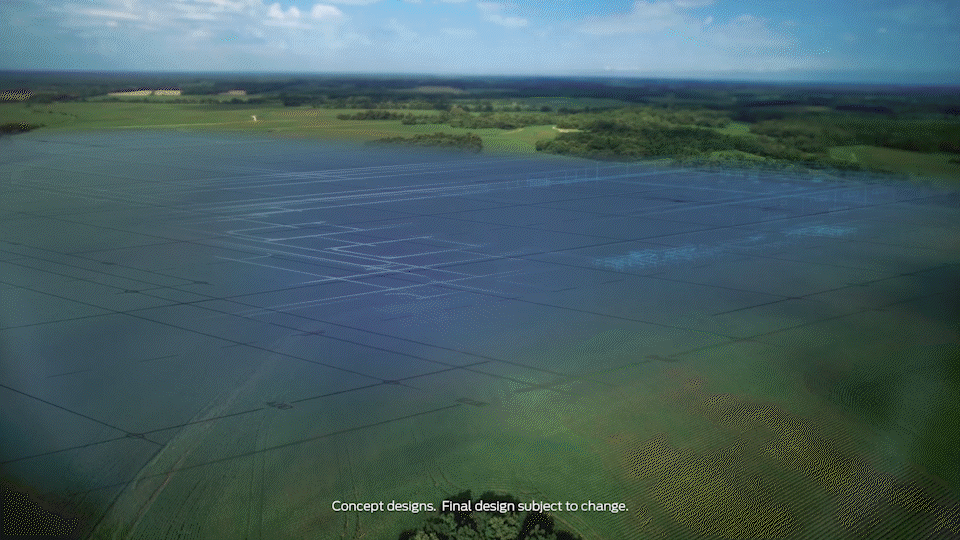Ford Motor and battery manufacturer SK Innovation plan to spend $11.4 billion to build two massive campuses in Tennessee and Kentucky that will produce batteries as well as the next-generation of electric F Series trucks — a project the companies said will create 11,000 new jobs.
Facilities on the two campuses are designed to cover the entire ecosystem of building an electric vehicle from battery cell production and recycling to a supplier park and an assembly plant. Ford is contributing $7 billion to the project, the largest single manufacturing investment in its 118-year history. The investment is part of Ford’s previously announced plan to put $30 billion towards electric vehicles by 2025.
The automaker also said it will spend $525 million over the next five years on high-tech job training across the United States, starting in Texas. The investment will focus on training auto technicians to support Ford’s coming onslaught of electric and connected vehicles.
Ford’s ‘mega’ campus plans — the first facilities that the automaker has constructed in a generation — are meant to support its growing portfolio of EVs, including the Mustang Mach E, the Ford eTransit cargo van and the upcoming F-150 Lightning pickup truck, which has already received more than 150,000 pre-orders from customers. It’s also part of the company’s strategy to drive down battery costs to the $80 per kilowatt-hour pack level.
“The timing of these investments is very important, because we see a critical mass for a transition to battery electric vehicles right on the horizon,” Lisa Drake, Ford’s chief operating officer in North America, said in a media briefing Monday. “And we’ve already seen evidence of that in the industry and now from our own recent product launches.”
And Ford is bullish on the demand for EVs. The company predicts that one-third of the full size pickup segment will be fully electric, by 2030, Drake noted.
Monday’s announcement follows a string of planned investments by Ford, including an injection of $250 million and 450 news jobs to increase production capacity of its upcoming F-150 Lightning to 80,000 all-electric trucks annually. Those funds and jobs will be spread out across its Rouge Electric Vehicle Center in Dearborn, Michigan, Van Dyke Electric Powertrain Center and Rawsonville Components Plant, Ford said.
It also comes less than a week since Ford announced plans to partner with Redwood Materials to create a closed loop system that will cover recycling production scrap and EVs at the end of their life as well as supplying the automaker with raw battery materials. Securing a supply of batteries — or the materials to make them — has prompted the automotive industry to partner with cell manufacturers and increasingly turn to companies like Redwood Materials.
Drake provided more details about that partnership Monday, noting that Redwood Materials will set up a recycling facility on its so-called Blue Oval City campus near Memphis, Tennessee.
Tennessee campus
Once completed. the $5.6 billion campus in Stanton, Tennessee will rival the size and population of a small village. The 3,600-acre campus, or nearly 6 square miles, will be designed as a closed loop manufacturing center. This means that materials used in the production can be reused to make new EVs.
The campus will have a battery production facility operated in partnership with SK, a supplier park and an assembly plant dedicated to electric F Series trucks. The battery manufacturing facility will be able to produce 43 gigawatt hours of cell capacity. Ford said the assembly plant will be designed to be carbon neutral from the start of production in 2025.
Kentucky campus
Ford said it will build twin battery plants on the campus located in the central Kentucky town of Glendale. Batteries produced at the plants will be used in a new lineup of Ford and Lincoln branded electric vehicles later this decade. Production of the lithium-ion batteries is expected to begin in 2025.
The 1,500-acre battery campus, which Ford is calling BlueOvalSK Battery Park, will cost about $5.8 billion and employ 5,000 people. The twin battery plants will be capable of producing up to 43 gigawatt hours each for a total of 86 gigawatt hours annually. Adding in the third battery cell plant in Tennessee will push the total capacity up to 129 GWh, according to Yoosuk Kim, executive vice president and global head of marketing at SK.
In all, that’s enough capacity to power over 1 million electric vehicles, Drake said.
Ford has previously said that its global plans for battery electric vehicle calls for at least 240 gigawatt hours of battery cell capacity by 2030. That is roughly 10 plants’ worth of capacity. Ford has previously said that 140 GWh will be required in North America, with the balance dedicated to other regions, including Europe and China.
Source Link Ford, SK to spend $11.4B to build two US manufacturing campuses dedicated to EVs and batteries

Leave a Reply